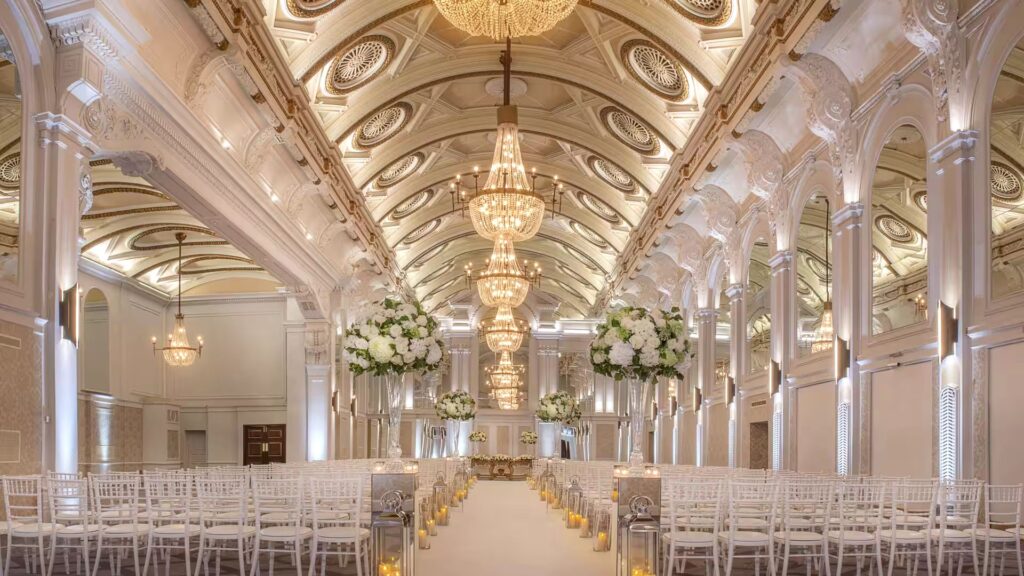When it comes to marriage ceremonies, there’s a world of options. No two love stories are the same, and neither should be the day you pledge your lives to each other. Whether you’re looking to honor religious traditions, celebrate love in a non-religious setting, or plan a destination wedding with luxurious touches, you deserve to have a ceremony that feels authentically “you.”
Here, we’ll explore the kinds of marriage ceremonies available and how you can personalize yours to reflect your beliefs, values, and unique story. And yes, for those wondering—you can get married in a church as a non-religious or LGBTQ+ couple, depending on your preferences and the church’s policies.
Let’s look at the options:
1. Traditional Church Weddings
For many couples, getting married in a church is a dream come true. Churches carry a sense of grandeur, elegance, and sacred history that can add a deeply meaningful layer to your vows. Traditional church ceremonies are perfect for couples who want to honor their religious beliefs, blending ancient customs with the beauty of holy settings.
However, the beauty of today’s world is that many churches welcome non-religious and LGBTQ+ couples, provided they align with the specific church’s ethos. If you envision a classic wedding with religious elements but aren’t traditionally religious, explore churches that emphasize inclusivity. Many faith-based communities warmly welcome couples from all walks of life, understanding that love itself is sacred.
2. Luxurious Non-Religious Venues
For those seeking a non-religious ceremony that feels equally majestic, an array of luxurious venues awaits. Grand hotels, historic estates, modern penthouses, and even picturesque castles offer spaces for a lavish ceremony where the setting feels like a sanctuary in its own right.
These venues offer versatility, allowing you to infuse the day with personal touches, blending cultural symbols, family traditions, or heartfelt vows that speak to your unique bond. A non-religious venue doesn’t mean sacrificing elegance or meaning—quite the opposite, in fact. You can work with a wedding planner to craft a ceremony that draws on meaningful moments, blending luxury with intimacy and warmth.
3. Registry Office & Destination Celebration
If you dream of a romantic, exotic destination wedding, the logistics can sometimes be tricky. One elegant option is to take care of the legal part at a local registry office and then host a symbolic ceremony abroad. This choice offers you the freedom to celebrate your love in a breathtaking locale—imagine exchanging vows at sunset on a beach in Santorini or in the lush gardens of a French château.
Many countries have made symbolic ceremonies seamless, allowing you to craft an unforgettable, personalized event after taking care of the legalities at home. This option not only opens up luxurious global settings but also simplifies the formalities, allowing you to focus on the beauty of your celebration.


4. Civil Ceremonies: Modern, Minimalist, and Meaningful
Civil ceremonies, held in registry offices, courthouses, or even grand municipal buildings, are perfect for couples who prefer a secular approach. They offer the simplicity of a legally binding marriage without religious elements, with the option to personalize the ceremony to make it truly your own.
For those who prefer a modern minimalist vibe or want a smaller, more intimate ceremony, a civil service is an excellent choice. Afterward, you can celebrate with an elegant reception in a luxury venue or have a private dinner with close friends and family. Some couples even hold a second ceremony that’s entirely dedicated to a symbolic gesture of love, such as an exchange of personal vows in a more picturesque or meaningful location.
5. Symbolic Ceremonies: Perfect for Diverse Beliefs and Blended Cultures
In a world of diverse beliefs and multicultural unions, symbolic ceremonies have become a way for couples to honor different traditions without adhering to a strict religious structure. If you and your partner come from different cultural or religious backgrounds—or prefer to express your love outside traditional norms—a symbolic ceremony offers you the freedom to create something unique.
This option is especially popular for LGBTQ+ couples and those who want a luxury ceremony free from formalities. You can incorporate symbolic rituals, cultural practices, and meaningful traditions, like handfasting or lighting a unity candle, all while customizing the setting to reflect your personalities.
Choosing the Ceremony That’s Right for You
As you design your day, remember that your wedding is a celebration of your love and commitment, not bound by convention but defined by what’s meaningful to you as a couple. From inclusive church ceremonies to symbolic unions in dreamy destinations, you can choose from countless luxurious, bespoke options.
Your ceremony is more than just an exchange of vows; it’s a statement of who you are together. Whether you’re religious, non-religious, or creating a ceremony entirely your own, let it be a day that feels right for you, with every detail as exceptional as the love you share.
For couples considering a non-religious wedding in a church, it’s important to know that there are options available, but they may vary depending on the specific church and its policies. Here are some key points you can highlight in your blog post:
1. Understanding the Flexibility of Venues
Many churches in the UK, particularly those that are no longer actively used for religious purposes, are now open for civil weddings. These buildings, while still retaining their historic and architectural beauty, no longer require religious components as part of the ceremony. This allows couples to enjoy the traditional charm of a church without the religious aspect.
2. Cultural and Historical Appeal
Churches often offer a beautiful and iconic setting that resonates with tradition, regardless of one’s personal beliefs. The grand architecture, stained glass windows, and acoustics create a stunning environment for a ceremony, making it appealing to couples who want to blend modern values with historical significance.
3. Alternative Ceremonies
Many couples opt for celebrants or humanist ceremonies in these venues. These officiants focus on creating a personalized ceremony that reflects the couple’s values, without religious undertones. Humanist weddings, for example, are designed to focus on love, connection, and shared life goals, offering a meaningful alternative to religious services.


4. Legal Considerations
In the UK, civil ceremonies must be conducted in a venue licensed for marriages. Some deconsecrated churches or other historic buildings repurposed for events may be licensed for civil weddings. For those wanting the look of a traditional church wedding, checking the venue’s legal standing for such events is essential.
5. Personalizing Your Ceremony
Non-religious weddings allow for a great deal of personalization. Couples can include readings, music, or symbolic acts that are meaningful to them without adhering to religious conventions. This freedom makes a non-religious ceremony in a church particularly appealing for those wanting to create a unique, personal experience.
6. The Appeal of Tradition without Doctrine
A non-religious wedding in a church setting allows couples to honor their love of tradition without the religious context. The setting of a church can give a sense of gravity and continuity while the ceremony remains entirely focused on the couple’s personal beliefs and desires.
7. Choosing the Right Venue
Researching venues is crucial. Some churches may allow a mix of spiritual but non-denominational services, while others may offer complete flexibility for non-religious ceremonies. It’s worth exploring historical or disused churches, which may have been converted into multi-purpose venues that can host non-religious weddings.


